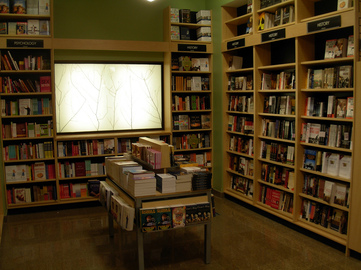There are times when as a writer you will purposefully stop yourself from reading too much: when working on a first draft, for example, or fleshing out the first hazy ideas for a book. But generally, reading is pretty essential to the writer's craft. Sometimes writers worry that their own style will be 'polluted' somehow. I think the solution is not to stop reading but to never read one author, genre or style of writing exclusively when you're at a crucial point in your own work. Reading widely opens your mind to all the different ways that words can be used and keeps your own style from getting overshadowed.
So just how wide should this reading be? I began thinking about this, and came up with a list of unusual and strange things I've read over the years in my quest to read as widely as possible. In no particular order, it includes:
- An ancient Bible I rescued from being thrown away, and the Hindu text The Mahabharata, both from cover to cover.
- Several footballers' autobiographies: I was a big Arsenal supporter as a teenager, and reading these books also taught me that there are some very talented ghostwriters out there!
- Plenty of classic long books like Anna Karenina, Middlemarch and Doctor Zhivago
- Plenty of classic short books, like The Little Prince
- ...and several books that don't even have words at all, like Shaun Tan's The Arrival
- A Mills and Boon romance set in the Roman Empire: not a genre I'd probably read again, but romance writing definitely has something to teach us about what it's like for authors working in the strictest form of genre writing around.
- Every Greek tragedy and nearly every Shakespeare play - I'm still missing Coriolanus, Cymbeline and Henry IV
- All kinds of young adult books, from novels in verse (Make Lemonade) to the pioneering classics (The Catcher in the Rye)
- All kinds of 'literary fiction', from Anne Tyler to Milan Kundera. Books which are realist, surreal, magical, down-to-earth, philosophical, prosaic, epic, funny, tragic or absurd, which deal with the individual or the family or with great sweeps of history, which are set in every imaginable location real and fictional and in every time period when humans have inhabited the earth. Which makes you think, in the end, that 'literary fiction' isn't any kind of genre, really, just a collection of writers who don't write in a genre.
- Poetry of all kinds - in fact my favourite writer, Derek Walcott, is a poet
- Writers from every continent of the world - from countries as diverse as France, Italy, Sweden, Russia, Spain, Portugal, Greece, Nigeria, South Africa, China, India, America, Canada, Brazil, Colombia, St Lucia, Jamaica, Trinidad, Australia and New Zealand!
- and of course, all the books I can't even remember...
All this reading, as a writer, comes back to you. But there is one important thing I've learned: you have to remember to read as a writer, which means being alert to how the text was actually created rather than just sitting back and enjoying the show. It's a bit like watching a magician or illusionist at work. Recently, I went to see the great Derren Brown in his new show Infamous. While I was watching, as well as enjoying the performance, I was constantly trying to work out exactly what was going on: how a particular effect came about, what the sleight of hand behind the scenes really was that made the audience feel that specific emotion or reaction so strongly, whether we were being led along by the performance and forgetting to think carefully. Of course, I didn't succeed in working anything out! But with writing, which doesn't take place in real time, we have at least a better chance of figuring out what's behind the magic. If you concentrate and reread, you can often start to dissect what you're experiencing, and work out how it fits together, what was going through the author's mind when he or she created it.
So I think that advice is right: one of the most valuable things you can do as a writer is just to read, and to read as much and as carefully as possible. Of course, it isn't ever possible to work everything out. In fact, some of my favourite writers are the ones who frustrate me because I can't quite work out how they did it! How did George Eliot keep all the threads of Middlemarch in her head while writing one part at a time for serial publication, with only pen and paper? How did Virginia Woolf come up with the particular rhythm of her sentences in the last parts of To the Lighthouse? How did J.D. Salinger first create Holden Caulfield's voice, and how did he know it would jump off the page so convincingly? There will always an element of magic, too: something still to be discovered...
What are the strange and unusual things that you've ended up reading over the years? Do you think writers need to read extensively to learn about their craft? Let me know your thoughts, or even better, write me a list of your unusual reading in the comments below!

 RSS Feed
RSS Feed
